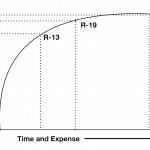There are several problems with building materials warranties, but one of the biggest is that they get used as a sales tool. Using the length of your warranty as an important part of your sales and marketing is almost as bad as using price.
Everyone should want to keep the customer’s mind off the issue of price for as long as possible. Discussing the length of your warranty won’t keep the conversation away from price and it also won’t help you differentiate your product.
Some building materials companies pride themselves in having really attractive warranties. But the problem is that even the most generous ones have little value for the customer. What the customer cares most about is how the product performs in the short term, which is when most problems are going to occur.
The longer a warranty is, the less value it has to the customer. And it’s usually prorated away to the point that it isn’t even worth filing a claim.
The building or home owner isn’t thinking about 20 years down the road—or more. They assume they will no longer be there by that point. And in today’s world of mergers, acquisitions and business failures, they assume that you won’t be there either.
For most building products, a warranty is simply a cost of doing business (“They have a 30 year warranty, and so do we.”)
Instead of relying on the number of warranty years to help your marketing and sales, tell the customer more about why you are a better choice for them.
Ideally, you’ll have a warranty that matches your competition’s. Anything longer has no value. If you genuinely want to have stronger warranty, cut out the legaleese that protects you more than it does the customer. Make it simpler and easier to understand.
One of the end customer’s biggest concerns is that they don’t know who to blame or who will be there for them when things go wrong. A big contractor, dealer or distributor has leverage with the manufacturer. The end customer, on the other hand, usually has no leverage. If you want to use your warranty as a competitive advantage, this is where you need to focus your efforts.
If, however, the warranty for your building product is shorter than the one offered by your competition then you are at a real disadvantage. You can count on losing a lot of sales, no matter how good your approach to sales and marketing. Customers take the shortest path to a decision. If your warranty is shorter, then they’ll assume it’s because your product must not be as good.
When selling, stay focused on the reasons your product is a better choice for that customer. When you focus on the warranty, the customer will jump to asking about your price.
A customer wants to believe that you are the best choice and they also get a warranty. Otherwise, they’ll assume your product is not as good, so you’re offering a warranty to ease their mind.
Subscribe To My Newsletter
If you like what I say, sign up for my newsletter here and get my weekly newsletter every Sunday night.
Thanks for the following comments. I’d like to hear your feedback and suggestions.
“Great Blog on Building Materials Product Warranties. I’ll be sure to pass this along to my sales team!
Have a great day!”
Steve Gress
Regional Sales Manager
Peak Building Supply
“That assumes the warranty is written in plain English and not by lawyers. Too many warranties, as Mark suggests, are nothing more than a get out of jail free card cloaked as a paper tiger. Beyond that, experience in the building product trade suggests a number of owner/operators of properties may not know what is on their building and lack much of the construction close out documentation. Or the products were not installed according to the detailed specification published by the manufacturer. Consider that the average holding period on many buildings for portfolio managers is less than 10 years. Often times detailed knowledge of the brand and system does not always pass with conveyance of the property, which complicates pursuing a warranty claim. Are warranties important? Sure they have a role to play. But as Mark suggests, if that is the only differentiation, it will be difficult for sales people to climb the mountain.”
Bruce Wingate
Vice President
Dryvit Systems, Inc.
“As mostly a buyer from the Operations and Supply Chain side, I saw warranties as a sales and marketing tool because they never really covered anything due to the exclusions and exceptions. However, as a Marketing VP, I discovered they were very important to customers, especially the owner or developer. The industry has promoted them for so long that the customer expects them to at least match the competition. Then it becomes a zero sum gain as your competitor offers more years than you – then you match – then they increase and so on. The stark reality is that a building is made of hundreds of interconnected and interdependent parts – the failures often occur at those intersections. The warranties are generally worthless at that point. Good article Mark!”
Marty Parker
Vice President of Marketing
Sto Corporation
Todd Wolf
Field General, Inc









